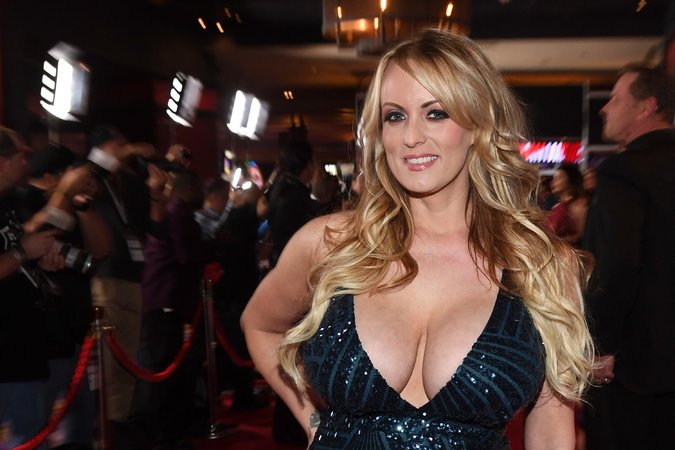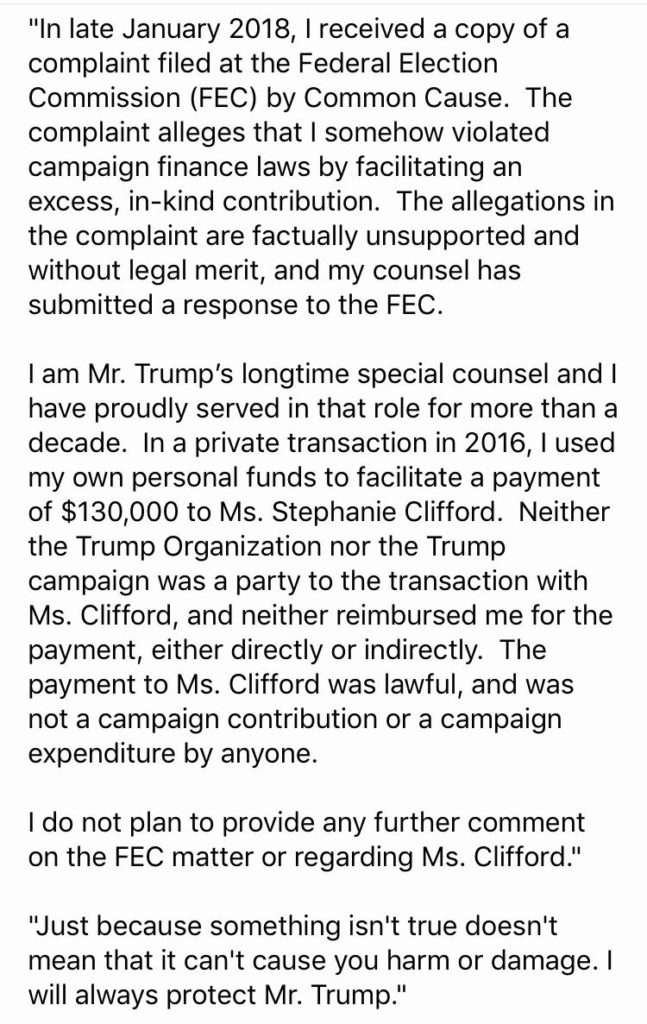Yesterday news broke that longtime Donald Trump attorney, Michael D. Cohen, was responsible for paying $130,000 to porn actress Stephanie Clifford (aka Stormy Daniels) on behalf of Trump in 2016, before the election.
“In a private transaction in 2016, I used my own personal funds to facilitate a payment of $130,000 to Ms. Stephanie Clifford,” Michael Cohen said in a statement. “Neither the Trump Organization nor the Trump campaign was a party to the transaction with Ms. Clifford, and neither reimbursed me for the payment, either directly or indirectly.”
When the underlying stories of they payoff started in January, many folks immediately started looking to see if such a payment violated campaign finance laws. And indeed, that is what most of his statement addressed yesterday.
But I’m looking at the New York Rules of Professional Conduct. Those of us in the personal injury bar know, for example, that advancing funds to clients is a big fat no-no. Does the same provision apply here?
The relevant rule reads as follows:
RULE 1.8:
CURRENT CLIENTS:
SPECIFIC CONFLICT OF INTEREST RULES
(e) While representing a client in connection with contemplated or pending litigation, a lawyer shall not advance or guarantee financial assistance to the client…
OK, you see that ellipses and you want to know what comes after, right? There are three exceptions, each of which invite an investigation to see if they apply:
(1) the transaction is fair and reasonable to the client and the terms of the transaction are fully disclosed and transmitted in writing in a manner that can be reasonably understood by the client;
(2) the client is advised in writing of the desirability of seeking, and is given a reasonable opportunity to seek, the advice of independent legal counsel on the transaction; and
(3) the client gives informed consent, in a writing signed by the client, to the essential terms of the transaction and the lawyer’s role in the transaction, including whether the lawyer is representing the client in the transaction.
The full statement is below and you can decide for yourself if you think it looks like an advance or guarantee of financial assistance (not because Trump needs it, but to hide it). (Edit: Whether there was litigation involved — matrimonial or contract? — is impossible for us to know from here.) Another problem may be that, from Trump’s perspective, this isn’t a transaction if he claims not to be repaying the money.
At the very least, it seems that Cohen has invited an investigation from the Disciplinary Committee. I’ve long said that Trump is a one-man bar exam with never-ending legal issues unlike any other person. That pattern continues today.
The statement:


Another issue that jumped out at me was authority. And there’s two distinct parts.
First, in my practice, I regularly use my own funds to pay third parties without my client’s permission for that particular transaction. I hire experts, I pay court reporters, etc. Nonetheless, I have express permission to do this (in the fee agreement’s section relating to case expenses) and implied permission to do this (in pursuit of their case).
How, exactly, was Cohen authorized to pay this particular sum?
Second, in my practice, there’s one thing I have very limited authority to do: execute a settlement. I have all kinds of express and implied authority to negotiate a settlement, but when it comes to actually executing it, I can’t do it without the client agreeing.
How, exactly, was Cohen authorized to execute this settlement agreement?
The answers to these two questions would tell us a lot. Was there some sort of standing implied authorization for Cohen to execute settlements with people and then pay them?
There’s a ton of issues in here, befitting a bar exam question.
He claims personal funds. Then says not reimbursed, but only with respect to Trump org and campaign.
The most likely guess, from everyone, is that it’s a subterfuge and the money came from elsewhere. Can you imagine if money not from Trump? Then you’re looking at a concealed campaign contribution by paying his personal debts.
And if it was really from Cohen and not reimbursed, then he’s the one who will be accused of using this as subterfuge for illegal campaign contribution.
Does the concept of “witness tampering” come into play here at some point ? A lawyer using “his own” funds to pay off…er… secure a promise of confidentiality from an adverse witness to, say, a messy domestic [or political] situation seems like a clever, if not exactly “ethical,” ruse to protect a “valued client” from having the adverse witness speak out …
except… he says he did this “on his own” so there is no “client” per se [& no privilege?] here since he presumably was not acting on behalf of or at the behest of anyone?
Apparently this was just simply a matter of one Bro extending a helping hand [filled with cash] “to help out,” [but not “for” or “in furtherance of client instructions from” or “with the knowledge of” or “on behalf of”] another Bro in a time of need to protect his buddy from a potentially ugly situation…oh… and from a possible political nightmare… without any reimbursement…what a guy… wish he was on MY team…
Seems like some Tax Returns… and billing records… and bank records… could all become very relevant and discoverable to follow the path here…Was the $130,000 a “loan” or a “gift” – What did that check look like? What steps were taken to hide it? What was in the “subject” line?
Back when Jerry Springer was the Mayor here in Cincinnati, he paid a hooker with a check -I guess he should have had his lawyer do it…
Does the concept of “witness tampering” come into play here at some point?
Witness tampering to what? There was no criminal investigation, or even a civil suit, arising out of the alleged dalliance. (Edit: Though there could be breach of contract in there someplace. It needs investigation to know for sure.)
Seems like some Tax Returns… and billing records… and bank records… could all become very relevant and discoverable to follow the path here…
Trump in the One Man Bar Exam. Everything he does raises new legal issues.